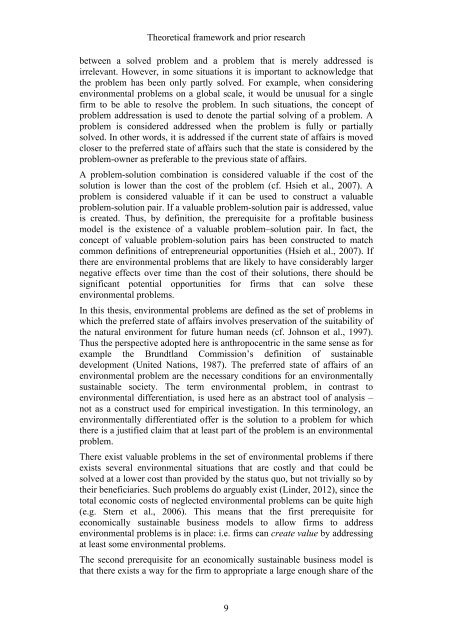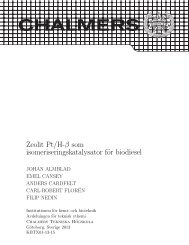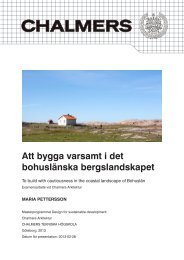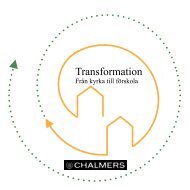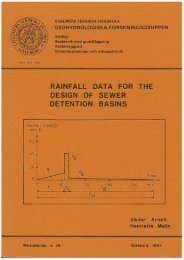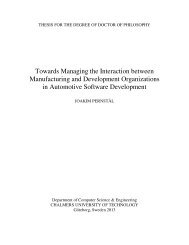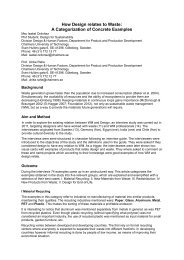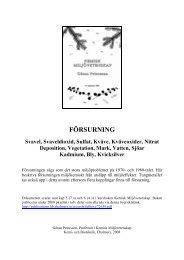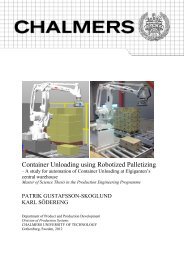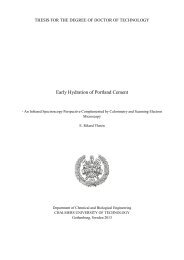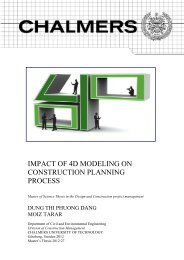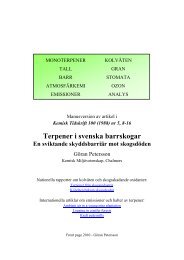Paper separationsblad - Chalmers tekniska högskola
Paper separationsblad - Chalmers tekniska högskola
Paper separationsblad - Chalmers tekniska högskola
You also want an ePaper? Increase the reach of your titles
YUMPU automatically turns print PDFs into web optimized ePapers that Google loves.
Theoretical framework and prior research<br />
between a solved problem and a problem that is merely addressed is<br />
irrelevant. However, in some situations it is important to acknowledge that<br />
the problem has been only partly solved. For example, when considering<br />
environmental problems on a global scale, it would be unusual for a single<br />
firm to be able to resolve the problem. In such situations, the concept of<br />
problem addressation is used to denote the partial solving of a problem. A<br />
problem is considered addressed when the problem is fully or partially<br />
solved. In other words, it is addressed if the current state of affairs is moved<br />
closer to the preferred state of affairs such that the state is considered by the<br />
problem-owner as preferable to the previous state of affairs.<br />
A problem-solution combination is considered valuable if the cost of the<br />
solution is lower than the cost of the problem (cf. Hsieh et al., 2007). A<br />
problem is considered valuable if it can be used to construct a valuable<br />
problem-solution pair. If a valuable problem-solution pair is addressed, value<br />
is created. Thus, by definition, the prerequisite for a profitable business<br />
model is the existence of a valuable problem–solution pair. In fact, the<br />
concept of valuable problem-solution pairs has been constructed to match<br />
common definitions of entrepreneurial opportunities (Hsieh et al., 2007). If<br />
there are environmental problems that are likely to have considerably larger<br />
negative effects over time than the cost of their solutions, there should be<br />
significant potential opportunities for firms that can solve these<br />
environmental problems.<br />
In this thesis, environmental problems are defined as the set of problems in<br />
which the preferred state of affairs involves preservation of the suitability of<br />
the natural environment for future human needs (cf. Johnson et al., 1997).<br />
Thus the perspective adopted here is anthropocentric in the same sense as for<br />
example the Brundtland Commission’s definition of sustainable<br />
development (United Nations, 1987). The preferred state of affairs of an<br />
environmental problem are the necessary conditions for an environmentally<br />
sustainable society. The term environmental problem, in contrast to<br />
environmental differentiation, is used here as an abstract tool of analysis –<br />
not as a construct used for empirical investigation. In this terminology, an<br />
environmentally differentiated offer is the solution to a problem for which<br />
there is a justified claim that at least part of the problem is an environmental<br />
problem.<br />
There exist valuable problems in the set of environmental problems if there<br />
exists several environmental situations that are costly and that could be<br />
solved at a lower cost than provided by the status quo, but not trivially so by<br />
their beneficiaries. Such problems do arguably exist (Linder, 2012), since the<br />
total economic costs of neglected environmental problems can be quite high<br />
(e.g. Stern et al., 2006). This means that the first prerequisite for<br />
economically sustainable business models to allow firms to address<br />
environmental problems is in place: i.e. firms can create value by addressing<br />
at least some environmental problems.<br />
The second prerequisite for an economically sustainable business model is<br />
that there exists a way for the firm to appropriate a large enough share of the<br />
9


